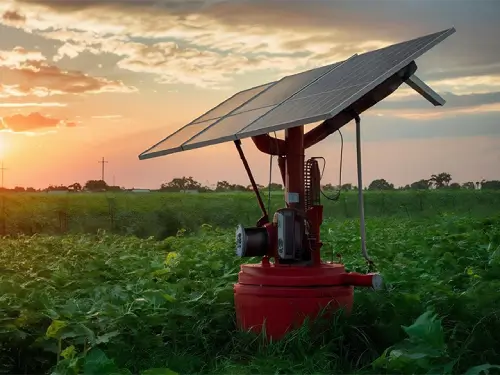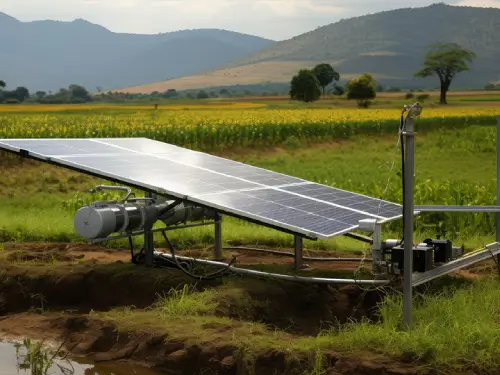Access to reliable water is crucial for agriculture in India. However, millions of farmers still rely on diesel pumps or inconsistent electricity for irrigation. Growing diesel prices and power shortages are making farming more difficult and expensive in India. This is where the introduction of solar water pumps for agriculture is transforming farming practices in India.
Solar water pumps are useful for agriculture because they use clean energy from the sun to supply water for irrigation, animals, and farm usage. It will not only reduce costs for farmers but also provide better productivity and more income. With government subsidies and programs such as PM-KUSUM, solar irrigation is becoming increasingly affordable and is being used more widely in India.
How does a Solar Pump Work?
Solar pumps use photovoltaic (PV) panels to capture sunlight and convert it into electricity. This power drives a motor that pumps water from wells, rivers, or reservoirs to fields. Unlike diesel or grid-powered pumps, solar pumps are cost-effective, eco-friendly, and reliable even in remote villages.
Key Features of Solar Pumps:
Uses of Solar Water Pumps in Agriculture
Solar pumps are broadly classified into four types, each designed for different water depths, energy setups, and usage needs.
| Uses | How it works |
|---|---|
| Irrigation | Solar pumps lift water from wells, rivers, or ponds and distribute it to crop fields. They can work with flood irrigation, sprinklers, or modern irrigation methods. |
| Livestock Watering | They supply water directly to tanks or troughs for cattle, goats, and other animals. Automated float systems prevent overflow. |
| Drip Irrigation Systems | Solar pumps provide the required pressure for drip lines, delivering water directly to the root zone. |
| Cold Storage Cooling | By running chillers, compressors, or water circulation systems, solar pumps help maintain optimal storage temperatures. |
| Field Operations | Portable solar pumps supply water for spraying pesticides, washing equipment, and cleaning produce or sheds |
How Solar Pumps Help Farmers?
Choosing the perfect solar pump for agriculture ensures reliable and sustainable irrigation while significantly improving overall farm productivity.
Key Features of Solar Pumps:
Benefits of Solar Pumps
Integrating solar water pumps into agriculture offers farmers a smart, eco-friendly, and cost-effective solution. Beyond meeting immediate irrigation needs, these pumps contribute significantly to the long-term sustainability of farming practices.
1. Lower Carbon Emissions:
Conventional pumps powered by diesel or grid electricity add to carbon emissions and environmental pollution. In contrast, solar pumps harness clean, renewable energy, cutting greenhouse gases and supporting eco-friendly farming.
2. Cost Savings and Profitability:
Rising fuel prices and electricity tariffs often make irrigation expensive. Solar pumps eliminate these recurring costs, providing farmers with long-term financial relief and improved profit margins.
3. Reliable Irrigation Access:
When paired with drip or sprinkler systems, solar pumps deliver water precisely where it’s needed, minimizing wastage. This is especially valuable in drought-prone areas struggling with water scarcity.
4. Low Maintenance, Long Life:
Unlike diesel pumps, which require frequent servicing, solar pumps have fewer moving parts and a longer operational life. They ensure reliable irrigation with minimal upkeep.
4. Climate Resilience:
Unpredictable rainfall and erratic monsoons often disrupt farming cycles. Solar pumps provide a dependable water source regardless of weather patterns, helping farmers adapt to the challenges of climate change.
Muradpur’s Floating Solar Irrigation Project
Muradpur village has become a model for sustainable farming through the use of floating solar panels installed at the Vadgaon reservoir on the Vena River. Instead of depending on diesel pumps or unreliable electricity, the village now runs a solar-powered lift irrigation system that has transformed local agriculture.
This project shows how floating solar irrigation can increase farm productivity, ensure energy independence, and serve as a replicable model for rural India.


State-Wise Solar Pump Installations & Insight
As of October 31, 2024, India had installed over 500,000 standalone solar pumps under the Pradhan Mantri Kisan Urja Suraksha evam Utthaan Mahabhiyan (PM-KUSUM) scheme.
| State | Approx Number of Solar Pumps Installed | Key Notes |
|---|---|---|
| Haryana | 154,000+ solar water pumps installed under various schemes. | In one of the leading states, these installations help reduce electricity demand, especially in agriculture. |
| Maharashtra | 197,863 pumps under PM-KUSUM | Leading in installations, has an aggressive policy and state + central subsidies support. |
| Rajasthan | 85,635 pumps installed under the same program | Also showing strong capacity for solar pump deployment; large agricultural zones benefit. |
| Uttar Pradesh | 53,182 pumps under the PM-KUSUM program | Lesser, but still significant, installations in a high agricultural area. |
| Jharkhand | 21,522 pumps under PM-KUSUM | Installation is lower compared to the top states; possibly due to terrain, awareness, and infrastructure. |
Government Solar Scheme for Farmers: Subsidies for Agricultural Pumps
The government promotes solar irrigation by providing financial support through national and state-level subsidy schemes. These incentives reduce the upfront cost of solar pumps, making them affordable for farmers. Such schemes encourage the adoption of clean energy, increase agricultural productivity, and lower electricity expenses.
PM-KUSUM Scheme Highlights:
Challenges in Implementing Solar Solutions
While solar water pumps offer numerous advantages, their adoption among farmers is still limited. Many rural farmers also require support in understanding installation, upkeep, and efficient use of solar irrigation systems.
Maintenance and Repair of Solar Agricultural Pumps
Solar-powered agricultural pumps come with a 5-year warranty period. During this time, if the pump stops working, the owning agency is responsible for repairs at no additional cost.
These systems require minimal maintenance — the main task is to keep the solar panels clean by regularly removing dust and dirt. This ensures maximum sunlight exposure and helps the system operate at peak efficiency throughout its service life.
FREE SOLAR EXPERT CONSULTATION
Conclusion
Solar water pumps are not just an option anymore; they are the future of sustainable and profitable farming in India. They reduce the cost of fuel, increase irrigation dependability and crop yields, which allows farmers to earn more income while protecting the environment. With government subsidies and support from partners, now is the best time to consider switching to solar power. At Alpex Solar, we will assist farmers in developing the best solar pump solution with a focus on the strategy, subsidy applications, installation, and aftercare support. Take the first step towards energy independence and smarter farming today with Alpex Solar and bring reliable solar irrigation to your farms.




